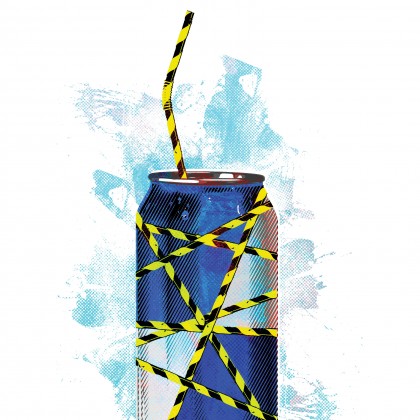No bull—energy drinks are big business. Fueled largely by millions of millennials craving a quick boost, the industry's growth has been as meteoric as some of the beverages' brand names suggest: Monster, Rockstar, Relentless. Sales of energy drinks surged 60 percent in the United States from 2008 to 2012, with no sign of slowing. By next year, annual sales will exceed $21 billion in the United States alone, according to a report from food and beverage industry analyst Packaged Facts.

Image credit: Gary Neill
But there is growing concern over potential harm from knocking back too many Red Bulls or Monsters.
Like their soda brethren, energy drinks can be sugar and calorie bombs, with up to 53 grams of the sweet stuff and 260 calories per can. Unlike coffee or soda, many energy drinks contain multiple stimulants and "vitality-enhancing" ingredients such as taurine, guarana, ginseng, and B vitamins; how these ingredients interact is largely unknown.
And now there is research that correlates consumption of energy drinks with unhealthy behavior among adolescents and college students, including smoking, alcohol abuse, drug use, fighting, and risky sexual activity.
In a study published in the Journal of Caffeine Research, Johns Hopkins scientists examined the relationship between energy drinks and risk. The study included a nationwide sample of 874 young adults, ages 18 to 28, who completed an online survey. The findings were stark. Respondents who consumed one or more energy drinks per week were twice as likely to smoke cigarettes and more than twice as likely to abuse prescription and illicit drugs such as Ritalin and cocaine. Energy drinkers were also more likely to smoke marijuana (56 percent claimed they had), use prescription opioids such as Vicodin (27 percent), drive without wearing a seatbelt (53 percent), drive while intoxicated (30 percent), and participate in a hazardous sport like snowboarding, bungee jumping, or parkour, a form of physical training run over a risky obstacle course (26 percent). Reckless sexual behavior reported by weekly energy drink consumers also was high. Sixty-three percent said they had engaged in unprotected sex with someone other than their spouses, and 69 percent said they'd had sex while drunk or high.
There's more. Maggie Sweeney, a postdoctoral research fellow in the School of Medicine's Department of Psychiatry and Behavioral Sciences and co-author of the study, says that respondents who reported using energy drinks more than once per week were also associated with a sort of impulsive decision making called delay discounting—for example, taking $20 now rather than waiting a week to receive $60.
Sweeney cautions that the nature of the relationship between energy drinks and risky behavior, besides the correlation noted in the study, remains unclear. The researchers are not making any causal link between downing a couple of Rockstars and subsequently having unsafe sex or driving while drunk. Sweeney says a tired person who might have left a party to go home and to bed after a couple of drinks might instead recharge with an energy drink, then stay and drink more. Other studies have concluded that high-caffeine beverages can affect drinkers' perception of how impaired they are; the jolt from an energy drink might mask the effects of too much alcohol, leading someone to think they're OK to drive.
The bottom line, Sweeney says, is that energy drinks merit further study because of their growing popularity, especially among young people who otherwise might not consume such high doses of caffeine. The research authors note that evidence is mounting for energy drink consumption as a warning sign among teenagers and young adults, and they recommend further research as to "whether it has potential to aid parents, educators, and clinicians in identifying individuals who are most likely to engage in risk behavior."
Posted in Science+Technology
Tagged psychiatry, energy drinks, behavioral sciences, risky behavior, caffeine









